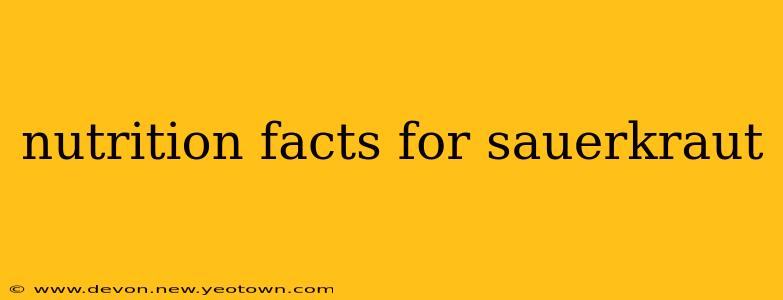Sauerkraut, that tangy, fermented cabbage, isn't just a delicious addition to your favorite dishes; it's a nutritional powerhouse packed with benefits for your gut and overall health. But what exactly makes it so special? Let's dive into the fascinating world of sauerkraut's nutrition facts, exploring its composition and uncovering its hidden health gems.
Imagine a crisp autumn day, the air filled with the scent of freshly harvested cabbage. That humble cabbage, through the magic of fermentation, transforms into something extraordinary: sauerkraut. This ancient food preservation method not only extends the shelf life of the cabbage but also unlocks a treasure trove of beneficial compounds.
What are the Macronutrients in Sauerkraut?
Sauerkraut boasts a surprisingly low-calorie count, making it a guilt-free addition to various diets. A typical serving (around one cup) provides roughly 20-30 calories. These calories are primarily derived from carbohydrates, with minimal fat and protein contributions. This low-calorie, high-nutrient profile makes sauerkraut an ideal choice for individuals watching their weight.
How Many Carbohydrates, Protein, and Fat are in Sauerkraut?
The carbohydrate content primarily stems from the cabbage's natural sugars, which are partially broken down during fermentation. The fermentation process also reduces the overall carbohydrate count compared to fresh cabbage. While sauerkraut contains some protein, it's not a significant source. Similarly, its fat content is negligible.
What Vitamins and Minerals are Present in Sauerkraut?
Beyond its macronutrients, sauerkraut shines with its impressive vitamin and mineral profile. It's a significant source of vitamin C, an essential antioxidant protecting your cells from damage. It also contains vitamin K, important for blood clotting and bone health, and vitamin B6, crucial for brain development and function. Moreover, sauerkraut is rich in minerals such as iron, potassium, and manganese. These contribute to various bodily functions, including energy production and immune system support.
Is Sauerkraut a Good Source of Fiber?
Yes! Sauerkraut is a respectable source of dietary fiber, contributing to a healthy digestive system. Fiber promotes regularity, aids in weight management, and helps maintain healthy cholesterol levels. This fiber content is largely thanks to the cabbage's retained structure during fermentation.
What are the Health Benefits of Sauerkraut?
The health benefits of sauerkraut extend far beyond its basic nutrient profile. The fermentation process creates beneficial bacteria, primarily lactic acid bacteria, which are probiotics. These probiotics are vital for gut health, impacting everything from digestion to immune function.
Does Sauerkraut Contain Probiotics?
Absolutely! The fermentation process is what makes sauerkraut a rich source of beneficial probiotics. These live microorganisms positively influence the gut microbiome, contributing to improved digestion, enhanced immunity, and overall well-being.
What are the Potential Side Effects of Eating Sauerkraut?
While generally safe, consuming large quantities of sauerkraut might cause some digestive discomfort in sensitive individuals, such as bloating or gas. Moderation is key. Individuals with certain medical conditions should consult their doctor before adding sauerkraut to their diet, especially those with gut issues or those taking specific medications.
Conclusion: Sauerkraut – A Delicious and Nutritious Choice
Sauerkraut offers a compelling blend of taste and nutrition. It's a low-calorie, fiber-rich food packed with vitamins, minerals, and probiotics. Incorporating sauerkraut into your diet can be a delicious way to boost your gut health, strengthen your immunity, and enjoy a variety of health benefits. Remember to choose high-quality, unpasteurized sauerkraut to maximize the probiotic benefits. So, next time you're looking for a healthy and flavorful addition to your meal, remember the humble, yet mighty, sauerkraut.

